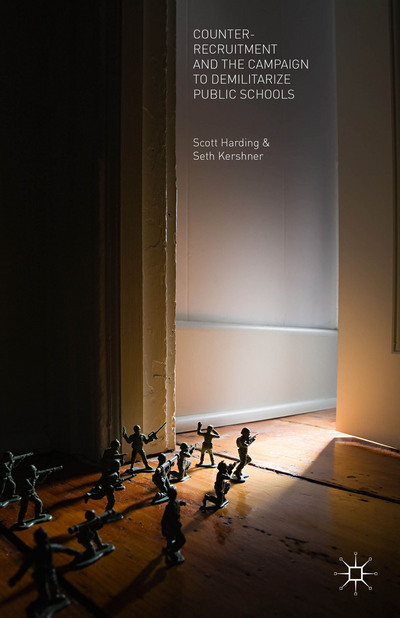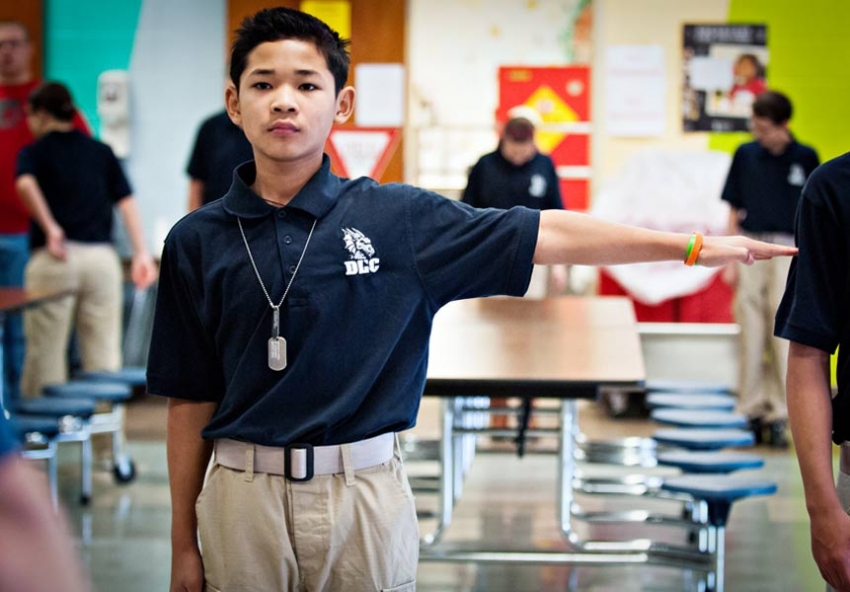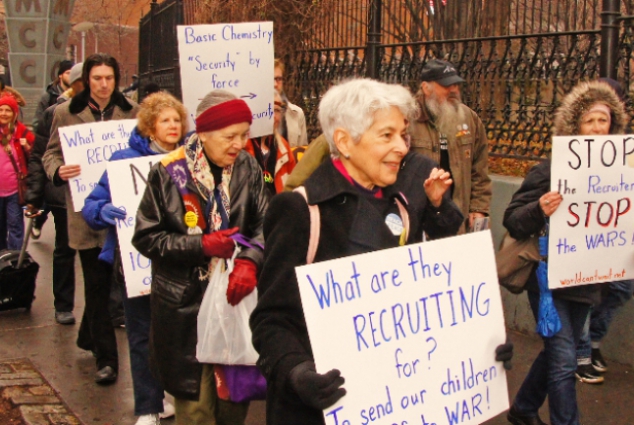Scott Harding, Seth Kershner -
| ISBN | 9781137515254 |
| Publication Date | September 2015 |
| Formats | Hardcover Ebook (EPUB) Ebook (PDF) |
| Publisher | Palgrave Macmillan |
 "This book brilliantly dissects not only the militarization of schools in the United States but also offers a systemic approach to forms of counter-recruitment. Not content to simply condemn military recruitment of students, the book offers parents and others a ray of hope in developing a language, strategies, and policies that can end this pernicious militarizing of schools and the recruitment of young people into America's ever expanding war machine. A must-read book for fighting back against militarized pedagogies and strategies of repression." - Henry Giroux, McMaster University, Canada, author of The Violence of Organized Forgetting (2013)
"This book brilliantly dissects not only the militarization of schools in the United States but also offers a systemic approach to forms of counter-recruitment. Not content to simply condemn military recruitment of students, the book offers parents and others a ray of hope in developing a language, strategies, and policies that can end this pernicious militarizing of schools and the recruitment of young people into America's ever expanding war machine. A must-read book for fighting back against militarized pedagogies and strategies of repression." - Henry Giroux, McMaster University, Canada, author of The Violence of Organized Forgetting (2013)
"What does sustainable anti-militarization look like? Who does it—and how? This fascinating book pulls back two curtains, first on how American high schools are being steadily militarized, and second, on how thoughtful, committed local counter-recruitment activists are rolling back that militarizing process, school by school, town by town. For any of us in critical security studies, American studies, peace studies, education, or women's and gender studies, this is a genuinely valuable book." - Cynthia Enloe, author of Nimo's War, Emma's War: Making Feminist Sense of the Iraq War (2010)
The United States is one of the only developed countries to allow a military presence in public schools, including an active role for military recruiters. In order to enlist 250,000 new recruits every year, the US military must market itself to youth by integrating itself into schools through programs such as JROTC (Junior Reserve Officers' Training Corps), and spend billions of dollars annually on recruitment activities. This militarization of educational space has spawned a little-noticed grassroots resistance: the small, but sophisticated, "counter-recruitment" movement. This book describes the various tactics used in counter-recruitment, drawing from the words of activists and case studies of successful organizing and advocacy. Counter-recruiters visit schools to challenge recruiters' messages with information on non-military career options; activists work to make it harder for the military to operate in public schools; they conduct lobbying campaigns for policies that protect students' private information from military recruiters; and, counter-recruiters mentor youth to become involved in these activities. While attracting little attention, counter-recruitment has nonetheless been described as "the military recruiter's greatest obstacle" by a Marine Corps official.
Scott Harding is Associate Professor and Associate Dean for Academic Affairs at the School of Social Work, University of Connecticut, USA. He has extensive advocacy and organizing experience on issues of homelessness, affordable housing, welfare, community development, and transnational labor solidarity. He was Executive Director and Policy Coordinator for the California Homeless & Housing Coalition, USA. He is a Board Member of Integrated Refugee and Immigrant Services (IRIS), and former Editor of The Journal of Community Practice.
Seth Kershner is an independent writer and researcher whose primary focus is the US military's growing presence in public schools. His work has appeared in a number of academic journals and books, as well as popular outlets such as In These Times, Rethinking Schools, and Sojourners, among others. Kershner currently works as a reference librarian at Northwestern Connecticut Community College, USA.
###

 Last year, Henry F. Moss Middle School in Bowling Green, Ohio, offered students a brand new course. And, as a headline in the local newspaper proclaimed, this was “not your traditional class.” For starters, the teacher—an army sergeant—had told the Bowling Green Daily News that one of his goals was to expose these seventh- and eighth-graders to “military values” that they could use as “building blocks” in life. To that end, students in the class earn military style ranks, engage in army-style “PT” (physical training) and each Wednesday, wear camouflage pants and boots.
Last year, Henry F. Moss Middle School in Bowling Green, Ohio, offered students a brand new course. And, as a headline in the local newspaper proclaimed, this was “not your traditional class.” For starters, the teacher—an army sergeant—had told the Bowling Green Daily News that one of his goals was to expose these seventh- and eighth-graders to “military values” that they could use as “building blocks” in life. To that end, students in the class earn military style ranks, engage in army-style “PT” (physical training) and each Wednesday, wear camouflage pants and boots. During the Second Battle of Fallujah in November 2004, 1st Lt. Jesse A. Grapes saved the lives of three wounded marines in his platoon by entering a burning house, where he encountered the enemy soldier who had been firing at his troops. Six years later Grapes was named headmaster of Benedictine College Preparatory, a Catholic military school in Richmond, Virginia. The June 2010 issue of the school’s newspaper, The New Chevron, called Grapes a “patriotic war hero.”
During the Second Battle of Fallujah in November 2004, 1st Lt. Jesse A. Grapes saved the lives of three wounded marines in his platoon by entering a burning house, where he encountered the enemy soldier who had been firing at his troops. Six years later Grapes was named headmaster of Benedictine College Preparatory, a Catholic military school in Richmond, Virginia. The June 2010 issue of the school’s newspaper, The New Chevron, called Grapes a “patriotic war hero.”
 Though the
Though the  David Swanson is the author of the new book, Daybreak: Undoing the Imperial Presidency and Forming a More Perfect Union, by Seven Stories Press and of the introduction to The 35 Articles of Impeachment and the Case for Prosecuting George W. Bush by Dennis Kucinich. In addition to cofounding AfterDowningStreet.org, he is the Washington director of Democrats.com and sits on the boards of a number of progressive organizations in Washington, DC.
David Swanson is the author of the new book, Daybreak: Undoing the Imperial Presidency and Forming a More Perfect Union, by Seven Stories Press and of the introduction to The 35 Articles of Impeachment and the Case for Prosecuting George W. Bush by Dennis Kucinich. In addition to cofounding AfterDowningStreet.org, he is the Washington director of Democrats.com and sits on the boards of a number of progressive organizations in Washington, DC. Jorge Mariscal is the grandson of Mexican immigrants and the son of a U.S. Marine who fought in World War II. He served in the U.S. Army in Vietnam and currently teaches at the University of California, San Diego.
Jorge Mariscal is the grandson of Mexican immigrants and the son of a U.S. Marine who fought in World War II. He served in the U.S. Army in Vietnam and currently teaches at the University of California, San Diego. Matt Guynn plays the dual role of program director and coordinator for congregational organizing for On Earth Peace, building peace and nonviolence leadership within the 1000+ congregations of the Church of the Brethren across the United States and Puerto Rico. He previously served a co-coordinator of training for Christian Peacemaker Teams, serving as an unarmed accompanier with political refugees in Chiapas, Mexico, and offering or supporting trainings in the US and Mexico.
Matt Guynn plays the dual role of program director and coordinator for congregational organizing for On Earth Peace, building peace and nonviolence leadership within the 1000+ congregations of the Church of the Brethren across the United States and Puerto Rico. He previously served a co-coordinator of training for Christian Peacemaker Teams, serving as an unarmed accompanier with political refugees in Chiapas, Mexico, and offering or supporting trainings in the US and Mexico. Rick Jahnkow works for two San Diego-based anti-militarist organizations, the Project on Youth and Non-Military Opportunities and the Committee Opposed to Militarism and the Draft. He can be reached at:
Rick Jahnkow works for two San Diego-based anti-militarist organizations, the Project on Youth and Non-Military Opportunities and the Committee Opposed to Militarism and the Draft. He can be reached at:  Pat Elder was a co-founder of the
Pat Elder was a co-founder of the 